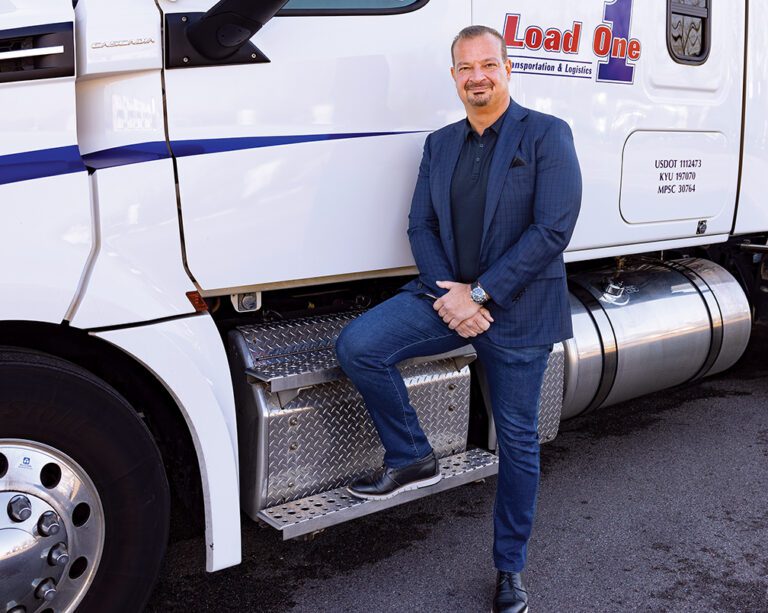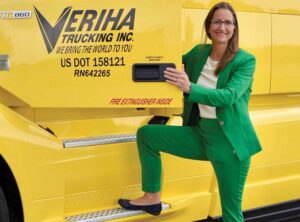Load One CEO John Elliott didn’t just step into the role of chairman of the Truckload Carriers Association (TCA) in March 2022. He burst onto the field, snatched the ball, and started running for the goal — and he never slowed his pace during the following 12 months. Together with newly appointed TCA President Jim Ward, he set out to not only grow the association’s membership, but also to expand and improve member benefits, revamp existing programs, and amplify the voice of truckload on Capitol Hill. Now, as he prepares to pass the ball to the next chairman, he says he would be hard-pressed to name TCA’s greatest accomplishment of the past year; however, he is quick to applaud the association’s members for their enthusiasm and engagement in both local and national initiatives. While Elliott is planning a couple of well-deserved breaks, it’s doubtful he’ll slacken his pace during the coming year. In addition to plans to grow and improve his own company, he says he intends to remain an active voice in TCA and the trucking industry as a whole. Following is the Truckload Authority team’s final chat with Elliott.
Mr. Chairman, thank you for joining us for the last of your Chat with the Chairman interviews. As usual, it has been an eventful year for the trucking industry. What have been TCA’s major accomplishments during your term?
It is simply amazing to me how fast this year as chairman has gone. It has been an extremely busy year for the association. I think the first big thing was a highly successful transition to our new president, Jim Ward. Our officers and I tasked him with a long list of desired improvements and initiatives. I can say without a doubt that Jim and our TCA staff are making it happen.
Our membership and retention numbers are the highest they have been in decades, and they continue to grow. We have revamped the TCA Professional Driver of the Year program, and we will see more winners and greater prizes. We will also see these individuals be a valuable resource as industry ambassadors to help tell the story of truckload as the year goes on. We have spent a good deal of time working to bring our Truckload Profitably Program in house, and that project is progressing very well. We have over 150 carriers submitting data and added another full-time facilitator as the value of the program to our members continues to grow.
How has TCA worked with other trucking organizations to strengthen the voice of the industry in Washington?
A great example of our government affairs push was our ability to help financially support the American Trucking Associations (ATA) in the fight against the predatory tolling by the State of Rhode Island. It was a great victory for our industry and all carriers, as this practice of truck only tolling would have quickly spread across many states and been another unfair economic burden placed upon our industry. It was a great example of how the strong relationship TCA and ATA share only makes the trucking industry more powerful in D.C. TCA and ATA have recently joined the Truckers Service Association as partners in its fight to preserve and protect the owner-operator/independent contractor model, which has been under attack more and more. This model is the basis of the American dream and is the exact way so many trucking companies were founded — with a dream, one man, and one truck.
What are some other highlights of the year?
Another major initiative involves the North American Transportation Management Institute (NATMI). Most people are very surprised to learn that NATMI is owned by TCA. We did not leverage this relationship in the past anywhere near its full potential, but that is changing. We are moving NATMI onto our Association Management System, and we will be making more announcements this year.
Last, but not least, we recently announced the launch of the Clean Freight Coalition with TCA as a founding member. This coalition will spearhead industry initiatives to help push for a logical, balanced, and realistic application of technology and regulations. Trucking has made huge improvements in our impact on the environment, and we are steadfast in our commitment to continue to improve. However, it needs to be done with well-thought-out policies that include trucking as a stakeholder at the table, not just policies put forward that can have disastrous implications for our industry and ultimately affect the people we serve.
Which of those accomplishments has given you the most pride in TCA and its members, and why?
I cannot honesty answer that question. What I am most proud of is the organization as a whole, its upward trajectory, and the exciting energy that comes from it. I have heard from so many members and vendors that the organization just continues to evolve in such a great direction. The ROI value of TCA has never been higher, in my opinion.
What can TCA members expect in the coming year?
We will see exciting new enhancements coming over the next year. We are launching a revamped fleet safety program that will improve upon this highly successful program and provide even more actionable data to our members to help them improve in this critical area of their companies. Our government affairs efforts continue to increase on behalf of our membership. We now have two internal and two external lobbyists who are focused on telling the story of truckload and helping to shape opinion on proposed regulations and legislation that can affect our members.
While Democrats still control the U.S. Senate after last fall’s elections, Republicans now lead the House. In addition, there has been a “changing of the guard” in the House Transportation & Infrastructure Committee. How do you foresee those changes affecting the trucking industry?
Great question, because going into the election there were many things still on the table as it relates to our industry, and that hasn’t changed regardless of the outcome. Trucking is the very backbone of this nation’s economy, and the truckload segment is the heartbeat. We know that many of our issues will continue to permeate in the next Congress. We must continue to challenge the threats to the independent contractor business model, creating new opportunities for truck parking, and of course, making this industry more attractive for people looking for rewarding careers. These are essential to moving the needle toward the advancing of our industry — and in many cases they should be viewed as bipartisan. Of course, as the years shake out, we will continue to weigh in on issues regarding equipment, highway funding, and certainly size and weight questions that could arise as the congressional demographics have changed.
Earlier this year the Biden administration released the U.S. National Blueprint for Transportation Decarbonization to eradicate all greenhouse emissions from the transportation industry by the year 2050. What do you believe will be the earliest impacts felt by motor carriers?
The earliest impacts are already being felt by motor carriers as we progressively continue to look at the equipment landscape and the environmental impacts that coincide with them. Our environment has no friendlier ally than our industry, and recent data has proven exactly that. In just over 35 years, it would take 60 of today’s trucks to produce the emissions of just one truck in 1988. Over the past 30 years, our engines have cut NOX and particulate matter emissions by more than 98%, eliminating harmful pollutants from the air we breathe. In knowing that, and wanting our industry to continue to be great stewards of the environment, it is essential that we continue to test equipment to the point that each has proven itself roadworthy. Our carrier members want to be an active part of the solution to this problem, to preserve the environment and ensure that the store shelves are stocked with the goods that this nation lives on. In short, the impact for these regulations are already being felt to the point that our industry must make sure the deadlines are realistic and that the changes to equipment are ones that truly work to fulfill the nation’s freight delivery needs.
It’s now been 15 years since the Federal Motor Carrier Safety Administration (FMSCA) launched the CSA (compliance, safety, accountability) program with an initial “test run.” How have you seen the program change over the years, and has it helped or harmed the freight industry?
I think the intentions of the FMCSA were very noble. I don’t think we are anywhere close to a finished product. I know the industry looks to continue to work with regulators to improve CSA. We all want a fair, consistent measurement tool, but the devil is in the details, and I personally do not see safety as an area that should be graded on a curve.
Of course, the issue of safety fitness determinations continues to appear on the DOT regulations report, and this may be the year that something gets done. The reality is that motor carriers should not be afraid to have their safety performance judged; however, that judgement must be done correctly. CSA continues to evolve from its original premise. They have incorporated the Crash Preventability Determination Program, removed the public viewing of scores because of the inconsistencies, and continue to try to improve the system. Discussions surrounding the Item Response Theory have proven themselves to be just discussions, as few could actually understand the algorithm changes that would have been required for the program. We must continue to insist that this program be as accurate as possible, eliminating geographical biases that exist and of course continue to account for clean inspections as much as we do for the bad ones.
Of course, the ratio of trucks on the road to safe, available parking is an ongoing concern. Last fall, new truck parking legislation was introduced in both the House and the Senate. If passed, how will these bills help motor carriers and drivers?
Ample, safe parking is a critical need for our drivers. As we fight to retain and attract new drivers to the industry, parking is a huge issue. Drivers spend over an hour a day of wasted time looking for parking. On top of that, without hours-of-service flexibility, drivers are not able to utilize their available hours effectively as the fear of not finding a parking spot and running over hours in violation weighs on them. All this is stressful, and as an industry we want safe, well-rested drivers who are not stressed behind the wheel.
In addition to giving the trucking industry a voice in Washington, TCA is active in a number of community service efforts, including partnering with the Vietnam Veterans Memorial Fund (VVMF) to transport The Wall that Heals across the nation during its annual tour. Tell us a little about TCA’s affiliation with this project, and how members can get involved.
Since 2015 TCA has partnered with VVMF to bring the Wall That Heals to communities across the country. The wall itself is a replica of the Vietnam Veterans Memorial in Washington, D.C., and our industry has risen to the challenge of supporting the transportation efforts of this monument. It is imperative that we continue to volunteer our equipment and drivers that help preserve the legacy of the wall and allow for cities and towns across the country and education everyone about the war and its impacts. Without the generous donations of trucks and drivers, this monument likely would not have the impact that is does.
What other service opportunities does TCA offer its membership?
Besides the Vietnam Wall project, TCA has been a long-time supporter of Wreaths Across America and promoting its mission to remember, honor, and teach those military members that made the ultimate sacrifice. Also, at this year’s annual convention, our spouse/partner activity TCA is teaming up with Volunteer Orlando to drive change and support a local at-risk school to help them break the cycle of poverty and hardship. Trucking is an industry that has always stepped up when needed and looks to give back.
As your term comes to a close, what are your plans for the immediate future?
I look forward to continuing with TCA in my role as past chairman and working with our incoming chairman and officers to continue the success. I also have a very exciting year ahead personally for my company as we continue to grow and build out our time-critical offerings. I am also looking forward to spending some time at a new condominium I recently had built in Cancun.
As is tradition, we always ask the outgoing chairman to give advice to the incoming chairman. What would be your advice to Dave Williams of Knight-Swift Transportation, who will soon be stepping into your shoes?
Dave has been one step behind me for seven years on the officer line. We have had a great working relationship, and on a personal level he is a great person and a good friend. Dave is very much like me in valuing and listening to our carrier and vendor members. We are and will continue to be a member-driven organization. I know Dave, with his wife Suzy by his side, will be an outstanding leader for TCA and the industry as a whole.
Thank you, Mr. Chairman, for a wonderful year. Any closing comments to the membership would be welcome.
Thank you to the members of TCA who entrusted me to be your chairman. As a third generation in trucking, it’s been an amazing journey — from a kid whose first job in trucking was sweeping out trailers to now being the chairman of the TCA. I do wish my late grandfather had been alive to see how far his decision to become a truck driver had affected my family’s life. I also want to thank Jim Ward, who has been an amazing friend, and I have to give a big thank-you to all of the TCA staff for all their hard work!
This article originally appeared in the March/April 2023 edition of Truckload Authority, the official publication of the Truckload Carriers Association.
Linda Garner-Bunch has been with The Trucker since 2020, picking up the reins as managing editor in 2022. Linda has nearly 40 years of experience in the publishing industry, covering topics from the trucking and automotive industry to employment, real estate, home decor, crafts, cooking, weddings, high school sports — you name it, she’s written about it. She is also an experienced photographer, designer and copy editor who has a heartfelt love for the trucking industry, from the driver’s seat to the C-suite.














